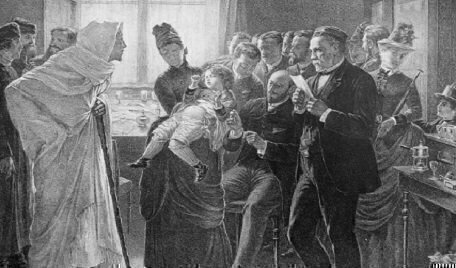[ad_1]
Within the face of future public well being emergencies just like the Coronavirus, a precedential Supreme Courtroom resolution in regards to the authorities’s energy to guard residents by quarantine and compelled vaccinations may obtain new curiosity.

On February 20, 1905, the Supreme Courtroom, by a 7-2 majority, stated in Jacobson v. Massachusetts that the town of Cambridge, Massachusetts may tremendous residents who refused to obtain smallpox injections. In 1901, a smallpox epidemic swept by way of the Northeast and Cambridge, and Massachusetts reacted by requiring all adults obtain smallpox inoculations topic to a $5 tremendous. In 1902, Pastor Henning Jacobson, suggesting that he and his son each had been injured by earlier vaccines, refused to be vaccinated and to pay the tremendous. In state courtroom, Jacobson argued the vaccine regulation violated the Massachusetts and federal constitutions. The state courts, together with the Massachusetts Supreme Judicial Courtroom, rejected his claims. Earlier than the Supreme Courtroom, Jacobson argued that, “compulsion to introduce illness right into a wholesome system is a violation of liberty.”
On February 20, 1905, the Supreme Courtroom rejected Jacobson’s arguments. Justice John Marshall Harlan wrote in regards to the police energy of states to control for the safety of public well being: “The great and welfare of the Commonwealth, of which the legislature is primarily the choose, is the idea on which the police energy rests in Massachusetts,” Harlan stated “upon the precept of self-defense, of paramount necessity, a neighborhood has the appropriate to guard itself in opposition to an epidemic of illness which threatens the security of its members.”
Jacobson had argued that the Massachusetts regulation requiring necessary vaccination was a violation of due course of underneath the 14th Modification, notably the appropriate “to reside and work the place he’ll” underneath the precedent of Allgeyer v. Louisiana (1897), a case that discovered {that a} state regulation stopping sure out-of-state insurance coverage firms from conducting enterprise within the state was unconstitutional restriction of freedom of contract underneath the 14th Modification. Harlan answered that whereas the Courtroom had protected such liberty, a citizen:
[M]ay be compelled, by pressure if want be, in opposition to his will and with out regard to his private needs or his pecuniary pursuits, and even his non secular or political convictions, to take his place within the ranks of the military of his nation and danger the possibility of being shot down in its protection. It isn’t, due to this fact, true that the ability of the general public to protect itself in opposition to imminent hazard relies upon in each case involving the management of 1’s physique upon his willingness to undergo affordable laws established by the constituted authorities, underneath the sanction of the State, for the aim of defending the general public collectively in opposition to such hazard.”
The Courtroom didn’t prolong the rule past the info of the case earlier than it. Harlan ended his opinion by stating the restrictions of the ruling: “We’re not inclined to carry that the statute establishes absolutely the rule that an grownup should be vaccinated if or not it’s obvious or might be proven with affordable certainty that he’s not on the time a match topic of vaccination or that vaccination, by purpose of his then situation, would critically impair his well being or most likely trigger his dying.”
Within the years following the case, the anti-vaccine motion mobilized and the Anti-Vaccination League of America was based three years later in Philadelphia underneath the precept that “well being is nature’s best safeguard in opposition to illness and that due to this fact no State has the appropriate to demand of anybody the impairment of his or her well being,” and aimed “to abolish oppressive medical legal guidelines and counteract the rising tendency to enlarge the scope of state drugs on the expense of the liberty of the person.” The League warned about what it believed to be the hazards of vaccination and permitting the intrusion of presidency and science into personal life,
When a separate query of vaccinations—state legal guidelines requiring youngsters to be vaccinated earlier than attending public faculty—got here up in 1922 in Zucht v. King, Justice Louis Brandeis and a unanimous courtroom held that Jacobson “settled that it’s inside the police energy of a state to offer for obligatory vaccination” and the case and others “additionally settled {that a} state could, persistently with the federal Structure, delegate to a municipality authority to find out underneath what situations well being laws shall turn out to be operative.” Extra lately, in 2002, a federal district courtroom declined to discover a exemption to necessary vaccinations legal guidelines for “sincerely held non secular beliefs” or a basic proper of oldsters to make choices regarding medical procedures of their youngsters.
The applying of Jacobson to the trendy age of vaccinations is a supply of scholarly debate, with some arguing that the case not applies in an period through which vaccines like HPV are usually not medically vital to stop the unfold of illness. However others preserve Jacobson’s significance at this time in offering ample energy to guard the general public well being, particularly with the specter of pandemics.
Nicholas Mosvick was a Senior Fellow for Constitutional Content material on the Nationwide Structure Heart.
[ad_2]
Source link




